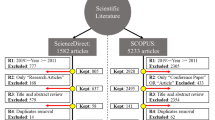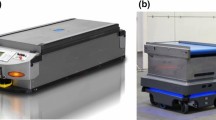Abstract
In today’s competitive environments, companies need to be cost-effective, environmental-friendly, and social-friendly to deal with several challenges that exist in markets. In this context, reconfigurable manufacturing systems (RMSs) have emerged to fulfil these requirements. RMS is one of the attractive manufacturing paradigms. Machine components, software, or material handling units can be added, removed, modified, or interchanged as needed and imposed by the necessity to react rapidly and cost-effectively to changing. A multi-objective multi-product process and production planning problem in a sustainable reconfigurable manufacturing environment (SRMS) is considered in this paper. Three pillars of sustainability, respectively social, environmental, and economic are formulated and optimised. First, a linear mixed-integer model is proposed. Second, a Lagrangian relaxation-based approach is developed to solve the problem on the large scales, where an exact method is used to solve the problem in small and medium cases with GAMS software. To illustrate the applicability of the proposed approaches, some numerical examples and analyses are presented. Finally, a sensibility study of the problem according to some parameters is performed.












Similar content being viewed by others
Availability of data and materials
The used data and materials are available when requested.
References
Mehrabi MG, Ulsoy AG, Koren Y (2000) Reconfigurable manufacturing systems: key to future manufacturing. J Intell Manuf 11(4):403–419
Rüßmann M, Lorenz M, Gerbert P, Waldner M, Justus J, Engel P, Harnisch M (2015) Industry 4.0: The future of productivity and growth in manufacturing industries. Boston Consulting Group 9(1):54–89
Bortolini M, Galizia FG, Mora C (2018) Reconfigurable manufacturing systems: literature review and research trend. J Manuf Syst 49:93–106
Lasi H, Fettke P, Kemper HG, Feld T, Hoffmann M (2014) Industry 4.0. Bus Inf Syst Eng 6(4):239–242
Benyoucef L (2020) Reconfigurable manufacturing systems: from design to implementation. Springer Series in Advanced Manufacturing, ISBN: 978–3–030–28782–5
Tang H, Li D, Wan J, Imran M, Shoaib M (2019) A reconfigurable method for intelligent manufacturing based on industrial cloud and edge intelligence. IEEE Internet Things J 7(5):4248–4259
Koren R (2020) The emergence of reconfigurable manufacturing systems (RMSs). In Reconfigurable Manufacturing Systems: From Design to Implementation (pp 1-9), Springer
Nayak NG, Dürr F, Rothermel K (2015) Software-defined environment for reconfigurable manufacturing systems. Proceedings of the 5th International Conference on the Internet of Things (IOT)
Massimi E, Khezri A, Benderbal HH, Benyoucef L (2020) A heuristic-based non-linear mixed integer approach for optimising modularity and integrability in a sustainable reconfigurable manufacturing environment. Int J Adv Manuf Technol 108:1997–2020
Yazdani MA, Khezri AH, Benyoucef L, Siadat A (2020) Multi-objective process and production planning integration in recongurable manufacturing environment: augmented e-constraint based approach. Paper presented at the 13th International Conference on Modelling, Optimisation and Simulation (MOSIM 2020)
Huang A, Badurdeen F, Jawahir IS (2018) Towards developing sustainable reconfigurable manufacturing systems. Procedia Manuf 17:1136–1143
Feng C, Huang S (2020) The analysis of key technologies for sustainable machine tools design. Appl Sci 10(3):731
Choi Y-C, Xirouchakis P (2015) A holistic production planning approach in a reconfigurable manufacturing system with energy consumption and environmental effects. Int J Comput Integr Manuf 28(4):379–394
Touzout FA, Benyoucef L (2019) Multi-objective sustainable process plan generation in a reconfigurable manufacturing environment: exact and adapted evolutionary approaches. Int J Prod Res 57(8):2531–2547
Khezri A, Benderbal HH, Benyoucef L (2020) Sustainable multi-objective process plan generation in RMS through modelling energy consumption. In Reconfigurable Manufacturing Systems: From Design to Implementation (pp 161-177), Springer
Khezri A, Benderbal HH, Benyoucef L (2021) Towards a sustainable reconfigurable manufacturing system (SRMS): multi-objective based approaches for process plan generation problem. Int J Prod Res 59(15):4533–4558
Azkarate A, Ricondo I, Pérez A, Martínez P (2011) An assessment method and design support system for designing sustainable machine tools. J Eng Des 22(3):165–179
Allen T, Hoekstra TW (1994) Toward a definition of sustainability. Covington, WW; DeBano, LF,(tech. coords.). Sustainable Ecological Systems: Implementing an Ecological Approach to Land Management. Gen. Tech. Rep. RM-247. Fort Collins, CO: US Department of Agriculture, Forest Service, Rocky Mountain Forest and Range Experiment Station 98-107
Malek J, Desai TN (2020) A systematic literature review to map literature focus of sustainable manufacturing. J Clea Prod 256:120345
Bhatt Y, Ghuman K, Dhir A (2020) Sustainable manufacturing. Bibliometrics and content analysis. J Clean Prod 120988
Liu S, Leat M, Smith MH (2011) State-of-the-art sustainability analysis methodologies for efficient decision support in green production operations. Int J Sustain Eng 4(3):236–250
Zhang H (2019) Understanding the linkages: a dynamic sustainability assessment method and decision making in manufacturing systems. Procedia CIRP 80:233–238
Liu Y, Ong S, Nee A (2014) Modular design of machine tools to facilitate design for disassembly and remanufacturing. Procedia CIRP 15:443–448
Aljuneidi T, Bulgak AA (2016) A mathematical model for designing reconfigurable cellular hybrid manufacturing-remanufacturing systems. Int J Adv Manuf Technol 87(5–8):1585–1596
Dubey R, Gunasekaran A, Papadopoulos T, Childe SJ, Shibin K, Wamba SF (2017) Sustainable supply chain management: framework and further research directions. J Clean Prod 142:1119–1130
Zahiri B, Zhuang J, Mohammadi M (2017) Toward an integrated sustainable-resilient supply chain: A pharmaceutical case study. Transport Res E-Log 103:109–142
Varsei M, Polyakovskiy S (2017) Sustainable supply chain network design: A case of the wine industry in Australia. Omega 66:236–247
Garetti M, Taisch M (2012) Sustainable manufacturing: trends and research challenges. Prod Plan Control 23(2–3):83–104
Dou J, Li J, Su C (2018) A discrete particle swarm optimisation for operation sequencing in CAPP. Int J Prod Res 56(11):3795–3814
Chaube A, Benyoucef L, Tiwari MK (2012) An adapted NSGA-2 algorithm based dynamic process plan generation for a reconfigurable manufacturing system. J Intell Manuf 23(4):1141–1155
Musharavati F, Hamouda A (2012) Enhanced simulated-annealing-based algorithms and their applications to process planning in reconfigurable manufacturing systems. Adv Eng Softw 45(1):80–90
Maniraj M, Pakkirisamy V, Parthiban P (2014) Optimisation of process plans in reconfigurable manufacturing systems using ant colony technique. Int J Enterp Netw Manag 6(2):125–138
Bensmaine A, Dahane M, Benyoucef L (2013) A non-dominated sorting genetic algorithm based approach for optimal machines selection in reconfigurable manufacturing environment. Comput Ind Eng 66(3):519–524
Haddou Benderbal H, Dahane M, Benyoucef L (2017) Flexibility-based multi-objective approach for machines selection in reconfigurable manufacturing system (RMS) design under unavailability constraints. Int J Prod Res 55(20):6033–6051
Khettabi I, Benyoucef L, Boutiche MA (2021) Sustainable recon_gurable manufacturing system design using adapted multi-objective evolutionary-based approaches. Int J Adv Manuf Technol 115:3741–3759
Jacob A, Steimer S, Stricker N, Häfner B, Lanza G (2019) Integrating product function design, production technology optimisation and process equipment planning on the example of hybrid additive manufacturing. Procedia CIRP 86:222–227
Liu M, An L, Zhang J, Chu F, Chu C (2019) Energy-oriented bi-objective optimisation for a multi-module reconfigurable manufacturing system. Int J Prod Res 57(19):5974–5995
Kaltenbrunner M, Huka MA, Gronalt M (2020) Automating production planning and control in pallet manufacturing – A case study. Procedia Manuf 42:119–124
Okpoti ES, Jeong IJ (2021) A reactive decentralized coordination algorithm for event-driven production planning and control: a cyber-physical production system prototype case study. J Manuf Syst 58:143-158
Hees A, Bayerl C, Van Vuuren B, Schutte CS, Braunreuther S, Reinhart G (2017) A production planning method to optimally exploit the potential of reconfigurable manufacturing systems. Procedia CIRP 62:181–186
Youssef AM, ElMaraghy HA (2006) Modelling and optimisation of multiple-aspect RMS configurations. Int J Prod Res 44(22):4929–4958
Abbasi M, Houshmand M (2009) Production planning of reconfigurable manufacturing systems with stochastic demands using Tabu search. Int J Manuf Technol Manag 17(1):125
Dou J, Dai X, Meng Z (2010) Optimisation for multi-part flow-line configuration of reconfigurable manufacturing system using GA. Int J Prod Res 48(14):4071–4100
Ghanei S, AlGeddawy T (2016) A new model for sustainable changeability and production planning. Procedia CIRP 57:522–526
Benderbal HH, Dahane M, Benyoucef L (2018) Modularity assessment in reconfigurable manufacturing system (RMS) design: an Archived Multi-Objective Simulated Annealing-based approach. Int J Adv Manuf Technol 94(1–4):729–749
Touzout FA, Benyoucef L (2019) Multi-objective multi-unit process plan generation in a reconfigurable manufacturing environment: a comparative study of three hybrid metaheuristics. Int J Prod Res 57(24):7520–7535
Khezri A, Benderbal HH, Benyoucef L (2019) A sustainable reconfigurable manufacturing system designing with focus on environmental hazardous wastes. Proceeding of the 24th IEEE International Conference on Emerging Technologies and Factory Automation (ETFA), pp 317-324
Kumar A, Pattanaik L, Agrawal R (2019) Optimal sequence planning for multi-model reconfigurable assembly systems. Int J Adv Manuf Technol 100(5–8):1719–1730
Bortolini M, Galizia FG, Mora C (2019) Dynamic design and management of reconfigurable manufacturing systems. Procedia Manuf 33:67–74
Zhang Y, Zhao M, Zhang Y, Pan R, Cai J (2020) Dynamic and steady-state performance analysis for multi-state repairable reconfigurable manufacturing systems with buffers. Eur J Oper Res 283(2):491–510
Neumaier A, Shcherbina O, Huyer W, Vinkó T (2005) A comparison of complete global optimisation solvers. Math Program 103(2):335–356
Babbar C, Amin SH (2018) A multi-objective mathematical model integrating environmental concerns for supplier selection and order allocation based on fuzzy QFD in beverages industry. Expert Syst Appl 92:27–38
Heidari-Fathian H, Pasandideh SHR (2018) Green-blood supply chain network design: Robust optimisation, bounded objective function & Lagrangian relaxation. Comput Ind Eng 122:95–105
Zheng M, Li W, Liu Y, Liu X (2020) A Lagrangian heuristic algorithm for sustainable supply chain network considering CO2 emission. J Clean Prod 122409
Yousefi-Babadi A, Tavakkoli-Moghaddam R, Bozorgi-Amiri A, Seifi S (2017) Designing a reliable multi-objective queuing model of a petrochemical supply chain network under uncertainty: a case study. Comput Chem Eng 100:177–197
Hong I-H, Chou C-C, Lee P-K (2019) Admission control in queue-time loop production-mixed integer programming with Lagrangian relaxation (MIPLAR). Comput Ind Eng 129:417–425
Fisher ML (2004) The Lagrangian relaxation method for solving integer programming problems. Manag Sci 50(12_supplement), 1861–1871
Liu Xj, Yi H, Ni Zh (2013) Application of ant colony optimization algorithm in process planning optimization. J Intell Manuf 24:1–13
Author information
Authors and Affiliations
Contributions
All the authors have involved equally in the realized work. Mr. M.A. Yazdani, A.H. Khezri, L. Benyoucef: paper writing, problem formulation, approaches proposal and experimental performing and analysis.
Corresponding author
Ethics declarations
Ethical approval
The submitted work is original and has never been published elsewhere in any form or language.
Consent to participate
Not applicable.
Consent to publish
Not applicable.
Conflict of interest
The authors declare no competing interests.
Additional information
Publisher's Note
Springer Nature remains neutral with regard to jurisdictional claims in published maps and institutional affiliations.
Rights and permissions
About this article
Cite this article
Yazdani, M.A., Khezri, A. & Benyoucef, L. Process and production planning for sustainable reconfigurable manufacturing systems (SRMSs): multi-objective exact and heuristic-based approaches. Int J Adv Manuf Technol 119, 4519–4540 (2022). https://doi.org/10.1007/s00170-021-08409-0
Received:
Accepted:
Published:
Issue Date:
DOI: https://doi.org/10.1007/s00170-021-08409-0




